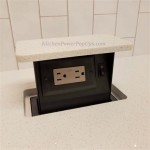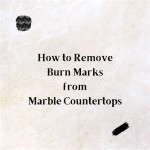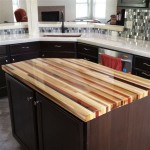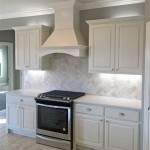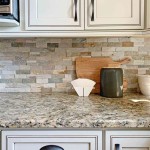How To Get Rust Out Of Countertops
Rust stains on countertops are a common household problem, particularly in kitchens and bathrooms where metal objects frequently come into contact with surfaces prone to moisture. These unsightly blemishes can be challenging to remove, depending on the countertop material and the severity of the stain. Understanding the nature of rust and employing appropriate cleaning techniques are crucial for restoring the countertop's original appearance. This article provides a detailed guide on how to effectively remove rust stains from various countertop materials.
Rust, chemically known as iron oxide, forms when iron or an iron alloy, such as steel, is exposed to oxygen and moisture. This electrochemical process results in a reddish-brown, flaky substance that adheres strongly to surfaces. When metal objects like cans, cookware, or shaving cream containers are left on damp countertops, the rust from these objects can leach onto the surface, creating a stain. The porous nature of some countertop materials allows the rust to penetrate deeper, making removal more difficult. Prompt action and the use of suitable cleaning agents are essential to prevent permanent discoloration.
Before attempting any rust removal method, it is imperative to identify the type of countertop material. Countertops are commonly made from materials such as granite, marble, quartz, laminate, and solid surface composites. Each material has different properties and reacts differently to various cleaning agents. Using an inappropriate cleaner can cause further damage, including etching, discoloration, or loss of shine. Consulting the manufacturer's instructions or a professional is recommended if the countertop material is unknown. Always test any cleaning solution in an inconspicuous area before applying it to the stain to ensure it does not cause any adverse effects.
Key Point 1: General Preparation and Safety Precautions
Regardless of the chosen rust removal method, certain preparatory steps are crucial. Begin by gathering the necessary materials, including cleaning solutions, soft cloths or sponges, a plastic scraper or spatula (if needed), and protective gear such as gloves and eye protection. These precautions are essential to safeguard the skin and eyes from potential irritation or damage caused by cleaning agents. Ensure the work area is well-ventilated to minimize exposure to fumes. Protect surrounding surfaces, such as cabinets and walls, by covering them with plastic sheeting or drop cloths.
Before applying any cleaning solution, thoroughly clean the affected area with a mild dish soap and water to remove any loose debris or surface dirt. This step allows the rust removal agent to effectively penetrate and interact with the stain. Rinse the area with clean water and dry it completely with a soft cloth. This initial cleaning provides a clear surface for the rust removal process and helps prevent the spread of contaminants.
When working with any chemical cleaning solution, always follow the manufacturer’s instructions carefully. Pay close attention to recommended dilutions, application methods, and safety warnings. Avoid mixing different cleaning products, as this can create hazardous fumes or unexpected chemical reactions. Use only the recommended amount of cleaning solution to minimize the risk of damage to the countertop and prevent excessive residue buildup. Always dispose of used cleaning materials and solutions properly, according to local regulations.
Key Point 2: Rust Removal Methods for Different Countertop Materials
The approach to removing rust stains varies based on the countertop material. Here are some effective methods for common countertop types:
Granite: Granite is a durable and relatively non-porous material. For mild rust stains, a paste made from baking soda and water can be effective. Apply the paste to the stain, allow it to sit for 30-60 minutes, and then gently scrub with a soft cloth or sponge. Rinse thoroughly with water and dry. For more stubborn stains, a commercial granite cleaner specifically designed for rust removal may be necessary. Alternatively, a poultice made from diatomaceous earth and hydrogen peroxide can be applied to the stain, covered with plastic wrap, and left overnight. The poultice draws the rust out of the granite. Remove the poultice, rinse, and dry the surface. Avoid using abrasive cleaners or scouring pads, as they can scratch the granite's surface.
Marble: Marble is a softer and more porous material than granite, making it more susceptible to damage from acidic cleaners. Therefore, it is crucial to use gentle, pH-neutral cleaning agents. A paste made from baking soda and water is a safe and effective option for mild rust stains. Apply the paste, let it sit for 15-30 minutes, and then gently wipe with a soft cloth. Rinse thoroughly with water and dry. For more stubborn stains, a commercial marble cleaner specifically formulated for rust removal should be used. Avoid using acidic cleaners like vinegar or lemon juice, as they can etch the marble's surface. A poultice method, similar to that used for granite, can also be employed, but use a pH-neutral poultice mixture. Seek professional help if the stain is deeply ingrained or if you are unsure about the appropriate cleaning method.
Quartz: Quartz countertops are non-porous and relatively resistant to staining. For most rust stains, a mixture of mild dish soap and warm water is sufficient. Apply the solution to the stain, let it sit for a few minutes, and then gently wipe with a soft cloth or sponge. Rinse with water and dry. For more stubborn stains, a paste made from baking soda and water or a commercial quartz cleaner can be used. Avoid using abrasive cleaners or scouring pads, as they can dull the surface. Vinegar can be used sparingly and diluted with water, but prolonged exposure should be avoided. Always test any cleaning solution in an inconspicuous area first.
Laminate: Laminate countertops are made from layers of plastic bonded to a backing material. They are relatively inexpensive but can be prone to scratching and damage from harsh chemicals. For rust stains on laminate countertops, start with a mixture of mild dish soap and warm water. Apply the solution, let it sit for a few minutes, and then gently wipe with a soft cloth or sponge. Rinse with water and dry. For more stubborn stains, a baking soda paste or a commercial laminate cleaner can be used. Avoid using abrasive cleaners, scouring pads, or harsh chemicals like bleach, as they can damage the laminate surface. A magic eraser can be effective for removing stains, but use it gently and test it in an inconspicuous area first.
Solid Surface Composites: Solid surface countertops are non-porous and resistant to staining. For rust stains, start with a mixture of mild dish soap and warm water. Apply the solution, let it sit for a few minutes, and then gently wipe with a soft cloth or sponge. Rinse with water and dry. For more stubborn stains, a baking soda paste or a commercial solid surface cleaner can be used. A mild abrasive cleaner, such as a cream cleanser, can also be used, but use it gently and rinse thoroughly. Avoid using harsh chemicals or abrasive scouring pads, as they can damage the surface. Regular cleaning and maintenance will help prevent stains from setting in.
Key Point 3: Advanced Rust Removal Techniques and Professional Assistance
In cases where initial cleaning attempts are unsuccessful, more advanced rust removal techniques may be necessary. One such technique involves the use of oxalic acid, a potent rust remover. Oxalic acid is available in powder form and must be handled with extreme caution due to its corrosive nature. Always wear gloves and eye protection when working with oxalic acid. Dissolve the oxalic acid powder in water according to the manufacturer's instructions. Apply the solution to the rust stain, let it sit for a specified period (usually a few minutes), and then rinse thoroughly with water. Neutralize the area with a baking soda solution after rinsing to ensure all traces of the acid are removed. Oxalic acid is effective but should be used as a last resort due to its potential for harm.
Another option for stubborn rust stains is the use of a commercial rust remover specifically designed for countertops. These products typically contain strong chemicals that dissolve rust stains. Follow the manufacturer's instructions carefully and test the product in an inconspicuous area before applying it to the stain. Ensure adequate ventilation and wear appropriate protective gear. Rinse the area thoroughly with water after use and neutralize it with a baking soda solution if recommended.
If the rust stain persists despite repeated attempts using various cleaning methods, or if you are uncomfortable working with strong chemicals, it is advisable to seek professional assistance. Professional countertop cleaning and restoration services have specialized tools, knowledge, and experience to safely and effectively remove even the most stubborn rust stains. They can also assess the countertop material and recommend appropriate cleaning and maintenance strategies to prevent future staining. In some cases, the countertop may require resurfacing or refinishing to completely eliminate the stain and restore its original appearance.
Preventing rust stains is always preferable to removing them. Implement preventative measures by promptly cleaning up spills and moisture on countertops, especially in areas where metal objects are frequently placed. Use mats or coasters under metal containers to prevent direct contact with the countertop surface. Regularly clean and maintain countertops according to the manufacturer's instructions to remove any lingering rust particles. By taking these precautions, the risk of rust stains can be significantly reduced.

Smells Like Food In Here Clean Rust Stain From Granite Countertop

Smells Like Food In Here Clean Rust Stain From Granite Countertop

How To Get Rust Off Of A Counter 5 Easy And Effective Ways

Smells Like Food In Here Clean Rust Stain From Granite Countertop

How To Keep Rust Stains Off Bathroom Countertops Youtube

How I Removed Rust Stains On Laminate Women Encouraged

Housecleaning Tips Removing Rust From Countertops

Smells Like Food In Here Clean Rust Stain From Granite Countertop

How To Remove Rust Stains From Granite Flemington

Use This Bathroom Staple To Clean Stubborn Rust Stains Off A Granite Countertop
See Also


